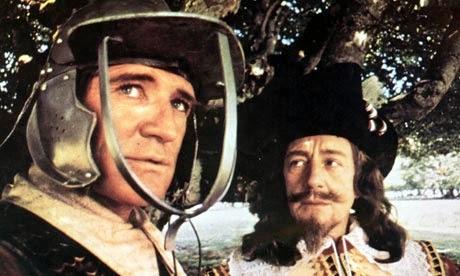 One of the traditional epic's last gasps, Ken Hughes's Cromwell (1970) flattens a fantastic story. Alec Guinness and a game supporting cast struggle against an awful script and Richard Harris at his scenery-gobbling worst. The English Civil War becomes a stiff tableaux, vivid but empty-headed spectacle.
One of the traditional epic's last gasps, Ken Hughes's Cromwell (1970) flattens a fantastic story. Alec Guinness and a game supporting cast struggle against an awful script and Richard Harris at his scenery-gobbling worst. The English Civil War becomes a stiff tableaux, vivid but empty-headed spectacle. Oliver Cromwell (Richard Harris) organizes Parliamentary resistance to King Charles I (Alec Guinness), disliked for his heavy-handed management and Catholic sympathies. Negotiations fail when Charles dissolves Parliament; Cromwell organizes supporters, the "Roundheads," into resistance against Charles' men (Cavaliers). After several military defeats, Cromwell reorganizes a New Model Army which trounces Charles. Cromwell becomes Lord Protector after Charles' execution, but finds governing post-monarchial England a laborious task.
Cromwell is a holy mess. Hughes can't keep his characters coherent: Cromwell whipsaws between angry traitor, reluctant rebel and despairing idealist - sometimes within the same scene! King Charles is a prudent ruler inexplicably manipulated by hot-headed advisers and a shrewish Queen (Dorothy Tutin). They act less out of personality or historical imperative than story requirements. In the last act, Cromwell changes direction so often he becomes a manic-depressive plot pawn.
Worse, Cromwell's script overflows with stilted epic speak and flaccid plotting. Between battle scenes and interminable debates we endure clunky homilies, with Cromwell explaining his ideal England to the King: "Such an institution is known as democracy, My Lord." We learn that both sides invoke God when Hughes cuts from Cromwell shouting "God damn this King!" to Charles at prayer. Hughes thinks this irony so clever he revisits it a half-dozen times. Everything's underlined by Frank Cordell's pompous score, all moaning chorus, rattling percussion and whooping brass.
At least Cromwell delivers good spectacle. Hughes and photographer Geoffrey Unsworth conjure widescreen battle panoramas worthy of Spartacus or Waterloo. But Cromwell's more interesting focusing on tactics: Cromwell and the King negotiate a battle's start time (which Cromwell violates), while Charles' cousin Prince Rupert (Timothy Dalton) sabotages Cavalier victories through recklessness. The technological divergence, with muskets and cannon alongside pikes and broadsword, stands out more than the rows of expendable extras.
Richard Harris starts at fever-pitch and never relents, each line pompously shouted or angrily growled. In a career not known for restraint, Harris's hamminess still shocks. Alec Guinness wisely chooses restraint, earning sympathy through subtle gestures and halting vocal delivery. Michael Jayston (Nicholas and Alexandra) fares well as Cromwell's right-hand man; Patrick Wymark (Where Eagles Dare), gleefully wicked as Charles' chief adviser; Timothy Dalton steals each scene as the dashing Prince Rupert. Robert Morley, Nigel Stock, Frank Finley, Patrick Magee, Charles Gray and Jack Gwilim inhabit smaller roles.
Since Cromwell treats its subject so superficially, our investment is threadbare. Once the vivid pageantry fades, we're left with an empty costume drama with nothing to say.

